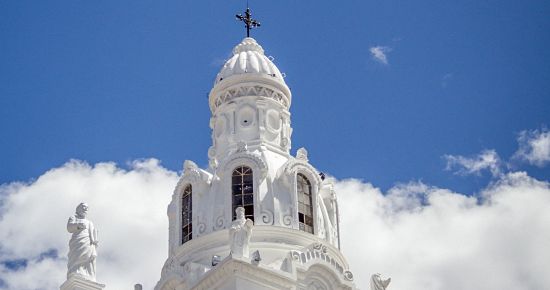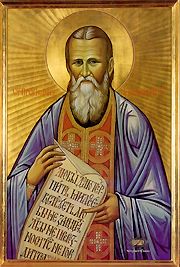 Advent is the prelude to new life in the nativity of Jesus. To live that new life, we must let go of the score keeping and the pride that fixes us to sorrow and death.
Advent is the prelude to new life in the nativity of Jesus. To live that new life, we must let go of the score keeping and the pride that fixes us to sorrow and death.
Today the church recalls a good man who lived in difficult times. Something new was coming to his nation, but it was not going to be good and he knew it. In the midst of troubled times, he saw that soon even the name of his nation would be changed. The decadence in the establishment, including organized religion, was great. There was a sense of foreboding in popular culture even if by many standards the nation was more prosperous than ever. Outward signs of patriotism were still present, but younger people especially were being disillusioned with the system. “What could be worse?” many asked and turned to nihilism and secularism, especially in the universities.
A good many things could be worse as Russia was about to discover in 1917.
 Before this, however, there was a man sent from God whose name was John. This forerunner was from Kronstadt, a married man, and a pastor. He left a series of reflections gathered into a book which is enormously helpful if you wish an alternative to hopelessness. John knew the problems and saw that few solutions were forthcoming, but his answer was not despair, hate, or anger. He turned to Christ and his solution has outlasted the Revolution that came shortly after his death: turn to God not for instrumental reasons, we cannot use God, but because God is real and we love Him because He is good.
Before this, however, there was a man sent from God whose name was John. This forerunner was from Kronstadt, a married man, and a pastor. He left a series of reflections gathered into a book which is enormously helpful if you wish an alternative to hopelessness. John knew the problems and saw that few solutions were forthcoming, but his answer was not despair, hate, or anger. He turned to Christ and his solution has outlasted the Revolution that came shortly after his death: turn to God not for instrumental reasons, we cannot use God, but because God is real and we love Him because He is good.
His simple words in My Life in Christ are from an authentic pastor who told the truth with mercy. Like Pascal, these are a collection of aphorisms or thoughts. They come from a man who read extensively, pastored people from every class, and was searching for what could satisfy his heart desires. He saw in the upper classes of his nation a foolish attempt to find happiness in stuff, learning facts, or finding power. This folly infects religious people who think that God’s truth exists just to give them wealth or position. This is a form of secularism, the foolishness rebuked when the man who believes in God pretends God does not see his scams.
Mercy! To be ready for the birth in Bethlehem, I must start by letting go of the lie that money, stuff, degrees, or power can make a man happy. We are animals and so such treats can satisfy our desires, and would not be harmful in themselves, but when that is all we have, then men turn bestial. We are, after all, not just animals. With eternity in our hearts, a longing for beauty, and a desire to create, we are more than brutes. Yet this is not in any way to become anti-physical:
Think oftener: Whose wisdom appears in the construction of your body? Who has ordered the laws of your thoughts, so that until now these laws are followed by all men? Who has engraved in the hearts of all men the law of conscience, so that until now it rewards the good and punishes the evil in all men? The Almighty, All-wise, and most gracious God! Thy hand is constantly upon me, a sinner, and there is no moment when Thy mercy leaves me. Grant me, then, always to kiss, with living faith, Thy gracious hand. Why should I go far to seek for the traces of Thy mercies, of Thy wisdom, and Thy omnipotence? O! how clearly these traces are visible to me! I, I myself am a miracle of God’s goodness, wisdom and omnipotence. I myself–on a small scale–am a whole world; my soul is the representative of the invisible world; my body–of the invisible one.
The Creator made all things a unity so that we can see the macrocosm in the microcosm. This is why a hatred of the body or of the mind is so damaging. We lose half of what is real!
When the Baby came to Bethlehem, His mother could see, as all mothers can, the visible and the invisible world, thought and body, but she could also see the Divine in a new way as she was the very mother of God. But here is John himself on the Nativity:
The Nativity of Christ.–He has come upon earth, He Who in the beginning created us from earth and breathed His Divine breath into us; He has come Who ” giveth to all life, and breath, and all things” [996] ; He has come, He Who by a single word called all things visible and invisible from non-existence into existence, Who by a word called into being birds, fishes, quadrupeds, insects, and all creatures, existing under His almighty providence and care; He has come, He Whom the innumerable hosts of Angels continually serve with fear and joy. And in what humility has He come! He is born of a poor Virgin, in a cave, wrapped in poor swaddling clothes, and laid in a manger. Riches, honours, glory of this world! fall down, fall down in humility, tearful devotion, and deep gratitude before the Saviour of men, and share your riches with the poor and needy. Do not pride yourselves on your visionary, fleeting distinctions, for true distinction can only be found in virtue. Glory of this world! learn here, before the manger, your vanity. Thus, let us all humble ourselves; let us all fall down in the dust before the boundless humility and exhaustion of the Sovereign of all, of God, Who has come to heal our infirmities, to save us from pride, vanity, corruption, and every sinful impurity.
Russia did not listen to this pastor, though some Russians did. We have the same chance that they had: find humility and so salvation.











